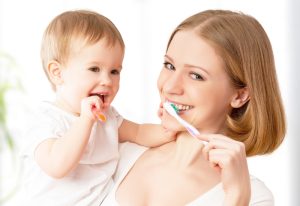The Basics of a Root Canal
May 22, 2018What To Do About Wisdom Teeth
June 14, 2018Many people think that the baby teeth aren’t very important, because they are going to fall out eventually. However, they are very important for the proper development of bite, alignment and the incoming adult teeth. If the baby teeth aren’t cared for, your child can experience problems with infections, decay, bite and alignment issues, trouble speaking, eating and more. Find out facts about the baby teeth and why they are so important!
The Erupting Baby Teeth
The baby teeth develop in the womb, even though infants are rarely born with teeth already in the mouth. They are simply too deep in the upper and lower jaws. Over time, they shift down into the gums, where they will start to pop out. Only in rare cases will a newborn have a tooth if it has popped out of the gums prematurely.
Most infants will have a fairly gummy smile for several months. Depending on genetics, the teething process will begin at 3 months, or it won’t start happening until a child is over a year old. However, by age 3, your child should have all 20 baby teeth in their mouth. If they don’t, make sure to schedule an appointment with your doctor and dentist to check for proper development. Studies have shown that the majority of infants will have teeth come into the mouth in a specific order. The teeth also tend to fall out in the order that they came in. That order is:
- The bottom two teeth, or the central incisors.
- The upper two teeth, also the central incisors.
- The bottom teeth on either side of the central incisors.
- The upper teeth on either side of the central incisors.
This pattern continues through the mouth all the way to the back until an infant has 10 teeth on top and 10 teeth on bottom.
A Child’s Growing Size
What is the point of having one set of teeth that are all going to fall out? There are several reasons that people are born with baby teeth, and it wouldn’t make sense for a tiny infant to have giant, permanent teeth when they are so small. All the bodily proportions on a child are tiny compared to an adult. As an infant grows, the body changes and adapts to fit the body’s growing size. However, the teeth are not that adaptable. Teeth are the hardest substance in the body, and are made of 96% solid mineral that doesn’t grow. In the very center of every tooth is a soft center called the “pulp”.
This pulp is made of soft tissue that has nerves and blood vessels that nourishes the tooth. However, the pulp is only needed while a tooth is being formed, although the pulp remains in the tooth throughout life. When a patient gets a cavity that gets large enough to hit the center pulp, they get pain and other symptoms because of the internal nerves. When root canals are done, the pulp of the tooth is taken out and the tooth is filled completely. Even though this pulp is living tissue, it is very small and does not make the teeth grow in size to fit the body’s changing size. Therefore, the teeth must fall out to make way for larger teeth that fit the emerging adult mouth.
The Importance of the Baby Teeth
Typically, the baby teeth will start to fall out around age 7 or 8. Most people will have all the baby teeth fall out by age 12 or 13. At birth, children are born with baby teeth high up inside their jaws, with an adult set of teeth above those baby teeth. The baby teeth come through the gums when an infant is small, then they fall out years later. Then, the adult teeth start to shift down into the gums to take the place of the baby teeth. If a baby tooth falls out too soon, a permanent tooth in the jaw will likely shift down into the empty space. However, this can happen too soon, which can make the other teeth shift down into the wrong place.
This can cause a crooked bite or teeth that are misaligned. If either of those problems happen, a child might have a speech impediment. They can develop problems chewing, biting, eating, talking and can start breaking or fracturing teeth by the uneven pressure placed on crooked teeth. The baby teeth are very important placeholders for permanent teeth to come in straight so eating, speaking and more are normal. If the baby teeth are very crooked or have shifted, they should be corrected with braces and orthodontic appliances. That correction will help the adult teeth to come in smoothly, in a straight line where they should be.
Take Care of the Baby Teeth
Basically, if you want your child to avoid major bite, alignment, eating, and speaking problems, they need their baby teeth. They need all 20, in the correct position, and they need to fall out at the right time so the adult teeth set up correctly. As soon as your child gets their first tooth, they should see the dentist within 6 months. Twice a year, make sure everyone visits the dentist for a comprehensive exam and dental cleaning to keep the teeth healthy. Have them see an orthodontist around age 7 or 8 so you can catch bite and alignment problems and fix them.
Lastly, make sure you are brushing and flossing your child’s delicate baby teeth so that they don’t decay and fall out. Help them learn proper technique as they grow. Make sure they brush and floss several times a day. Even though the baby teeth will fall out, they need tender loving care just like the adult teeth do. If you have questions about your child’s baby teeth, call Family & Cosmetic Dentistry of the Rockies today at (970) 267-0993!







